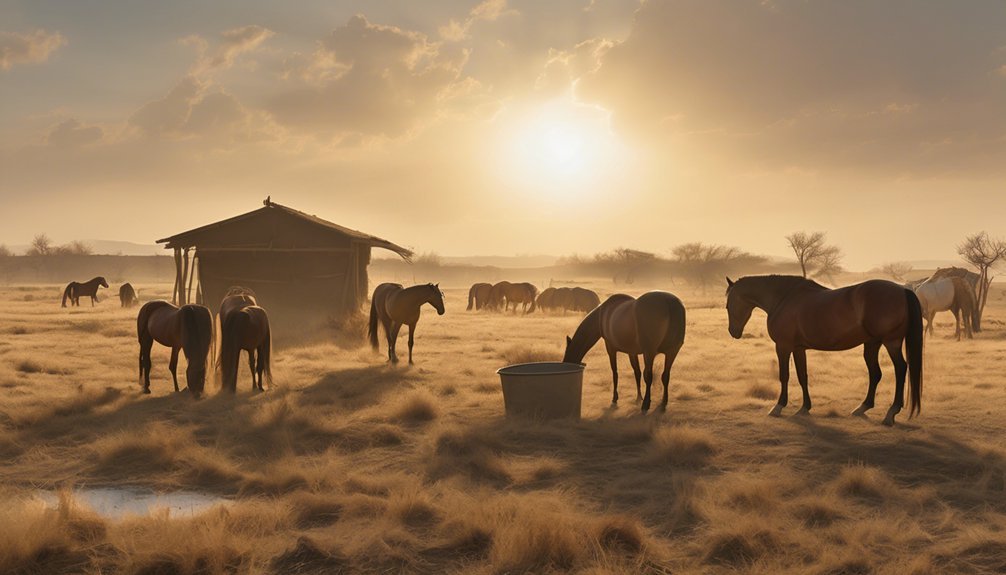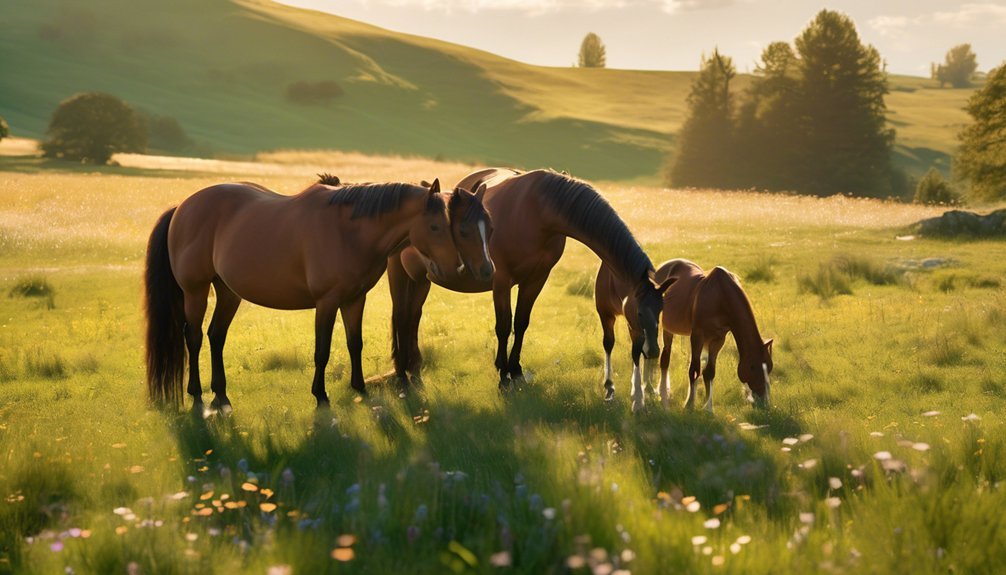
As a horse owner, you might notice subtle signs that indicate your horse isn't getting the proper nutrition. Changes in coat condition, energy levels, and even behavior can all point to deficiencies in essential nutrients. It's crucial to recognize these signs early, as they can lead to more significant health issues. Understanding what to look for can make all the difference in your horse's well-being and performance. What could these signs reveal about your horse's diet?
Key Takeaways
- Dull, lifeless coat and unusual shedding patterns indicate potential nutritional imbalances or deficiencies in essential fatty acids and vitamins.
- Weight loss or poor body condition suggests insufficient intake of protein, vitamins, and minerals, requiring a diet assessment.
- Persistent fatigue or lack of energy may result from inadequate carbohydrates, fats, or deficiencies in vital vitamins and minerals.
- Behavioral changes, such as increased stress or social withdrawal, can signal nutritional deficiencies affecting mood and cognitive function.
- Poor hoof quality, like brittleness or cracks, reflects inadequate nutrient absorption and highlights the need for essential vitamins and minerals in the diet.
Changes in Coat Condition
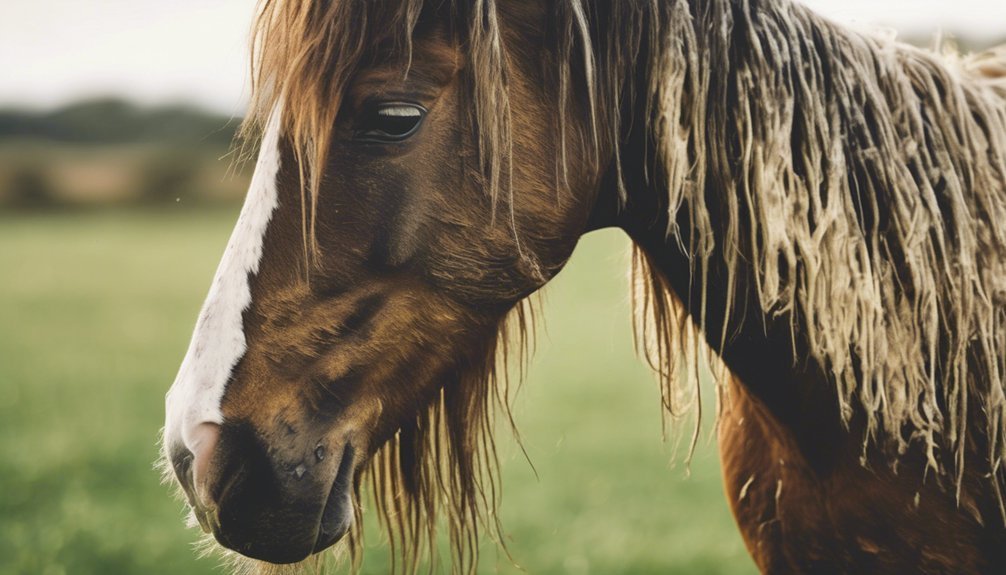
When horses experience nutritional deficiencies, one of the most noticeable changes is often seen in their coat condition. You might notice a decrease in coat luster, with your horse's once-glossy coat appearing dull and lifeless. This lack of shine can indicate insufficient essential fatty acids, vitamins, or minerals.
Additionally, pay attention to shedding patterns; if your horse sheds more than usual or develops patchy areas, this could signal an imbalance in their diet. These changes not only affect aesthetics but may also hint at underlying health issues.
Weight Loss or Poor Body Condition
If your horse is losing weight or displaying poor body condition, it's crucial to investigate potential nutritional deficiencies that might be at play.
To maintain proper weight management, you'll need to assess their diet closely. A balanced intake of essential nutrients is vital for optimal body composition. Look for signs of inadequate protein, vitamins, and minerals, as these can significantly affect weight and overall health.
Ensure your horse's forage is high-quality and consider if they require additional supplements. Monitor their body condition score regularly to track changes.
Lack of Energy or Fatigue
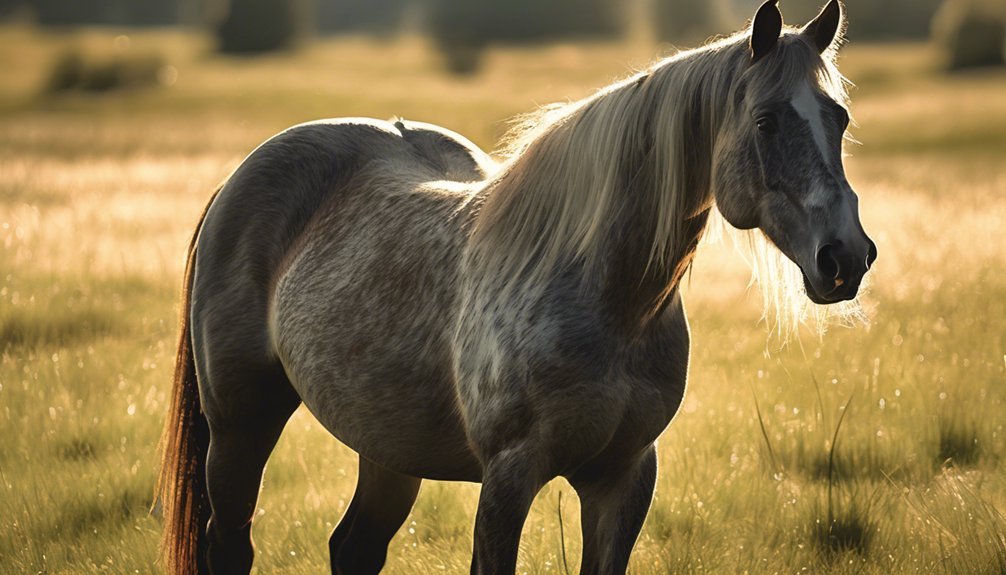
A lack of energy or persistent fatigue in your horse can often signal underlying nutritional deficiencies that require attention.
You might notice your horse struggling to maintain stamina during exercise or appearing lethargic during daily activities. Common fatigue causes can stem from inadequate energy sources, such as carbohydrates and fats, essential for optimal performance.
If your horse's diet lacks these vital components, it could result in reduced energy levels. Additionally, deficiencies in vitamins and minerals, like B vitamins and iron, can further exacerbate fatigue.
Monitoring your horse's diet closely and ensuring it meets its nutritional requirements will help maintain energy levels. Addressing these deficiencies promptly can restore your horse's vitality and overall well-being.
Behavioral Changes
Changes in your horse's behavior can often indicate underlying nutritional deficiencies that warrant investigation. You might notice increased stress responses, such as fidgeting or excessive whinnying. These behaviors can signal a lack of essential nutrients, leading to heightened anxiety and discomfort.
Additionally, social withdrawal can occur; your horse may isolate itself from others, avoiding interaction or play. This change isn't just a quirk—it's a sign that something's off, possibly due to inadequate vitamins or minerals affecting mood and cognitive function.
Pay close attention to these shifts; understanding them is vital for ensuring your horse's well-being. Addressing nutritional gaps can help restore not just physical health, but also emotional stability, allowing your horse to thrive socially and behaviorally.
Poor Hoof Quality
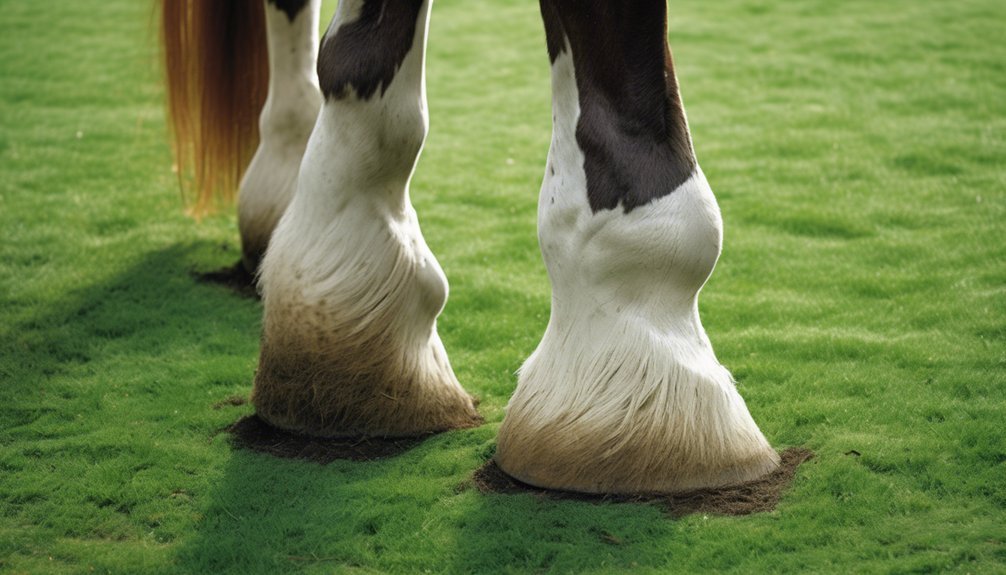
While you may not immediately connect poor hoof quality with nutritional deficiencies, the health of your horse's hooves is often a direct reflection of its overall diet. Nutrient absorption plays a crucial role in maintaining hoof integrity. A lack of essential vitamins and minerals can lead to brittle or cracked hooves, affecting your horse's comfort and performance.
To help you understand the relationship between nutrition and hoof quality, here's a quick reference:
| Nutrient | Hoof Quality Impact |
|---|---|
| Biotin | Strengthens hoof structure |
| Zinc | Promotes healthy growth |
| Protein | Supports overall integrity |
| Omega-3 Fats | Reduces inflammation |
Prioritizing hoof care through a balanced diet ensures your horse stays healthy and sound.
Digestive Issues
When horses don't receive a balanced diet, digestive issues often arise, leading to discomfort and potential health complications.
You might notice signs like colic or changes in manure consistency, which indicate digestive disturbances. A lack of essential nutrients can severely impact nutrient absorption, preventing your horse from gaining the energy and vitality they need.
For instance, inadequate fiber can slow down digestion, while insufficient vitamins and minerals can interfere with enzymatic processes essential for breaking down feed.
This imbalance not only affects their digestive health but can also lead to weight loss and lethargy.
It's crucial to monitor their diet closely and provide a variety of forage and quality feed to support their overall digestive function and well-being.
Dental Problems
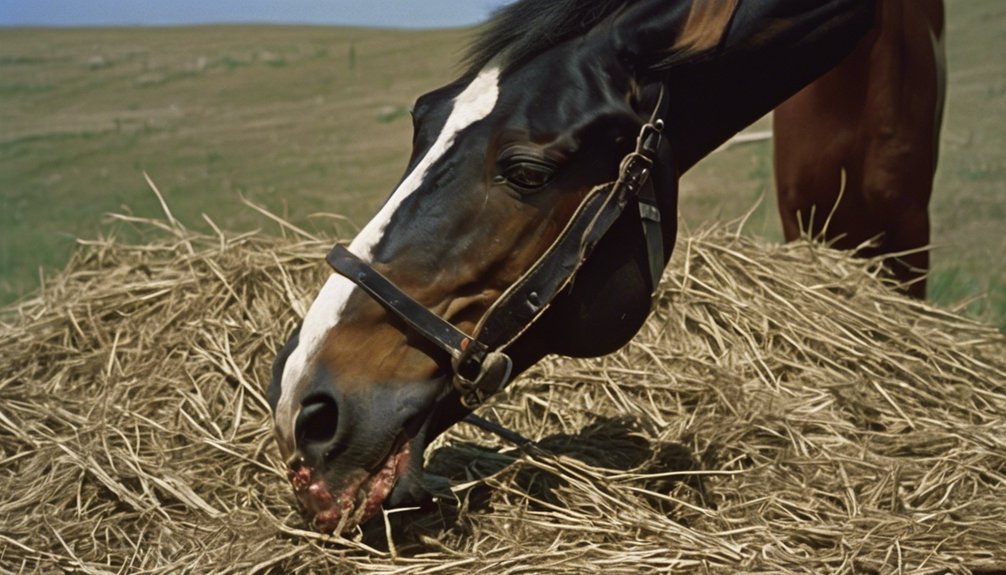
Digestive issues in horses can often be linked to underlying dental problems, which frequently go unnoticed until they lead to more significant health concerns.
Maintaining optimal dental health is crucial for proper equine nutrition. Here are some signs to look out for:
- Difficulty chewing or dropping feed
- Bad breath or unusual odor from the mouth
- Weight loss despite a normal appetite
- Excessive salivation or mouth sensitivity
These symptoms can indicate that your horse is struggling with dental issues.
If left unaddressed, poor dental health can lead to malnutrition and digestive disorders. Regular dental check-ups are vital to ensure your horse's teeth are in good shape, allowing them to properly digest their food and absorb essential nutrients for overall health.
Skin Irritations or Allergies
Skin irritations or allergies in horses can significantly impact their overall health and well-being. These issues often stem from nutritional deficiencies that lead to increased skin sensitivity, affecting how your horse absorbs nutrients. If you notice signs like itching, redness, or hair loss, it's crucial to investigate potential dietary gaps.
| Signs of Skin Irritations | Possible Nutritional Deficiencies |
|---|---|
| Itching | Omega-3 fatty acids |
| Redness | Zinc or Biotin deficiency |
| Hair loss | Protein or Vitamin E deficiency |
Addressing these deficiencies can enhance nutrient absorption and improve skin health. Regularly evaluate your horse's diet to ensure they receive balanced nutrition, promoting a healthier coat and minimizing irritations.
Abnormal Cravings or Pica

Abnormal cravings or pica in horses can signal underlying nutritional deficiencies that need to be addressed. When your horse exhibits pica behavior, it often indicates a nutritional imbalance that requires your attention. This condition drives your horse to consume non-food items, leading to potential health risks.
Here are some signs to watch for:
- Eating wood, dirt, or other non-edibles
- Increased licking or chewing on objects
- Weight loss or poor body condition
- Behavioral changes, such as boredom or anxiety
Understanding these signs is critical for ensuring your horse's well-being. By identifying and correcting the nutritional deficiencies, you can help restore balance and prevent further issues.
Always consult with a veterinarian to create an appropriate dietary plan tailored to your horse's specific needs.
Frequently Asked Questions
How Can I Prevent Nutritional Deficiencies in My Horse?
To prevent nutritional deficiencies in your horse, ensure a dietary balance by selecting high-quality feed. Regularly assess your horse's diet and consult an equine nutritionist to tailor their nutrition plan, keeping their health and performance optimal.
What Supplements Are Best for Common Deficiencies?
You might find that vitamin supplements like E and B-complex, along with essential mineral supplements such as magnesium and calcium, are crucial in addressing common deficiencies. Tailoring these choices to your horse's needs ensures optimal health.
How Often Should I Assess My Horse's Diet?
You should assess your horse's diet regularly, ideally every few months. Consider the feeding frequency and any changes in activity or condition, ensuring you adjust nutrients as needed to maintain optimal health and performance.
Can Stress Contribute to Nutritional Deficiencies in Horses?
Imagine a withering plant under constant shade; stress can stifle your horse's nutrient absorption. By focusing on stress management and making dietary adjustments, you'll help your horse thrive instead of merely survive.
Are Certain Breeds More Prone to Deficiencies Than Others?
Certain breeds do show susceptibility to nutritional deficiencies, influenced by genetic factors. You'll find that some breeds require specific nutrients more than others, making tailored nutrition crucial for their overall health and performance.
Conclusion
In conclusion, staying vigilant about your horse's health is crucial. Those subtle changes in coat, energy levels, or behavior could signal deeper nutritional deficiencies lurking beneath the surface. Don't wait until the signs become alarming—act now. Regularly assess their diet and consult with a veterinarian if needed. After all, your horse's vitality hinges on the balance of their nutrition. What might seem like a minor issue could spiral into something more serious if ignored.



